One of the easiest ways to increase performance is through the use of injectables: nitrous oxide, propane, and water/methanol. In all three, performance is increased, but each one goes about its business in a different way and has its own set of advantages and disadvantages. We took a look at all of them and firgured out how they work, how they make power, and what to watch out for.
The basic way to look at nitrous is that it's a turbocharger in a bottle. The air that your engine compresses is about 21 percent oxygen, which is what your engine uses to make power. Nitrous oxide is 36 percent oxygen, so when you are injecting it into your engine, you are simply adding more oxygen.
There's a second part to this equation, however. Nitrous needs to react with something to make horsepower, so more fuel must be added for extra oxygen to be burned. The more overfueled a diesel engine is, the more it will benefit from the use of nitrous. Nitrous oxide also comes into the engine at-127 degrees F and acts as a liquid intercooler, cooling the intake charge by a huge amount. This can actually become a problem because diesel engines need a certain amount of hot, compressed air to function correctly. If too much nitrous is injected, the charge can actually become too cold to burn completely and make less power than a smaller amount of nitrous. Expect gains of about 100-300 hp with nitrous, depending on how much fuel (black smoke) you are pumping out of your exhaust.
With propane injection, the propane acts like a catalyst and makes the diesel fuel burn more effectively. The difference between propane and an actual catalyst is that the propane is used up during the combustion process. During normal combustion, about 75-80 percent of the diesel fuel is burned, and the use of propane increases that number to nearly 100 percent. Propane is also a fuel in itself, so it can help make more power because it's extra fuel-plain and simple. As the engine becomes more efficient through the use of propane, large fuel-mileage increases can be seen in addition to power gains. You'll save some money at the diesel pump, but remember, you still have to get the propane tank filled periodically. With propane injection, gains of 75-100 hp are typical.
With a water/methanol injection, any percent combination of the two can be used-from 100 percent water to 100 percent methanol. The most popular, however, is a 50/50 mix, which acts as a cooling agent and delivers extra fuel. You can also use over-the-counter windshield-washer fluid, which is about 30 percent methanol and 70 percent water. If nitrous is turbo in a bottle, think of water/methanol as an intercooler in a bottle. The water part can cool things down and lower EGT, and the methanol will lower EGT while acting as extra fuel. The greater the percentage of water, the greater the EGT drop; the greater the percentage of methanol, the greater the power gain. With water/methanol, expect a noticeable drop in EGT and look for about a 40-70hp increase.
Nitrous: The main advantage is that you can add big power with relatively little risk. In a gasoline engine, too much nitrous can blow up your engine. In a diesel engine, too much nitrous will make the engine stutter and lead to less power. Nitrous is also one of the cheaper systems to buy. Making big power can also be one of nitrous' cons because it's easy to get in the 500-700 rear-wheel-horsepower range with it, but the rest of your engine needs to be built to handle that power level. These additions may include head gaskets, O-rings, rods, a stronger transmission, a converter, and plenty of other modifications. Also, nitrous is the most expensive to refill, gets used up the fastest, and is illegal for use on public roads, so keep your bottle valve closed when you are on the street.
Propane: One of the main advantages of propane is that it increases efficiency, so you can expect a jump in mpg and power when using it. Propane is also a fairly safe way to make an extra 70-100 hp on mostly stock trucks, but it can cause detonation under heavy load or in highly modified trucks. If you use your truck mostly for towing and daily driving, propane may be a good choice. The cons are having to mount a propane tank in your truck (usually taking up usable bed space) and having to refill it when necessary.
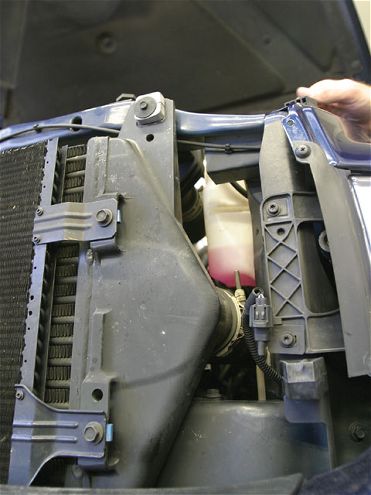
| With water/methanol injection, a tank must be mounted somewhere (arrow), usually in the engine compartment of the truck. Space is at a premium here, so manufacturers of water/methanol injection kits will make the tanks as big as possible without cramping the engine bay.
This combination is used mainly as an intercooler, so trucks that will benefit the most from water/methanol are those that may have EGT issues. Methanol is a fuel, and detonation is a possibility when injecting it, so be careful if your truck is highly modified. If you are using straight water (which is best for EGT), it's possible that rust will form, but running distilled water with additives can cure this problem. Again, like propane, if your truck is mostly stock, this shouldn't be an issue. If you are towing, water/methanol can be very helpful in keeping EGT down, which will let you produce more power for longer time periods.
In the end, which one is right for you depends on the vehicle's usage. For dragstrips, sled pulls, and other performance events, nothing will beat nitrous. For towing and a little more power, propane can be very useful. Vehicles that need a little extra help intercooling can use a water/methanol injection. Propane and water/methanol injection are relatively cheap to use, while nitrous can cost 50 cents to $1 every second you are using it. Propane and water/methanol work full time in your truck and can be used for weeks or months without a refill. Nitrous, on the other hand, is only used for brief stints and runs out fast. Consider what your vehicle is used for, and choose the injectable that's right for you.
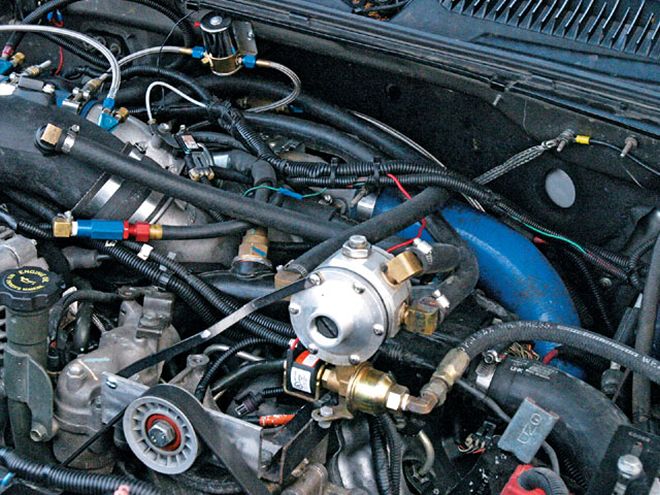
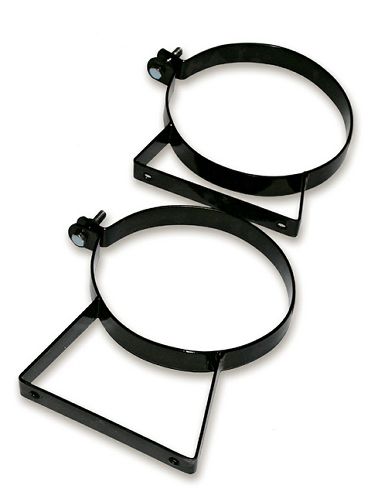

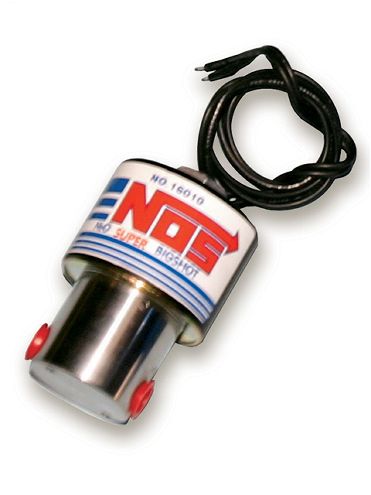
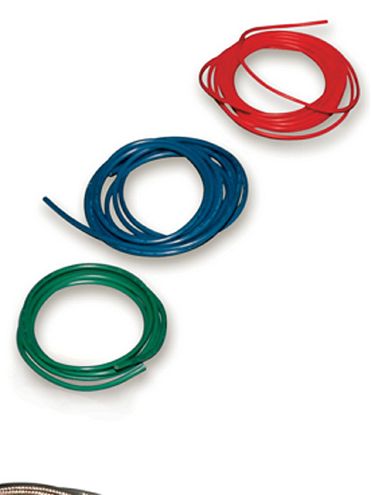
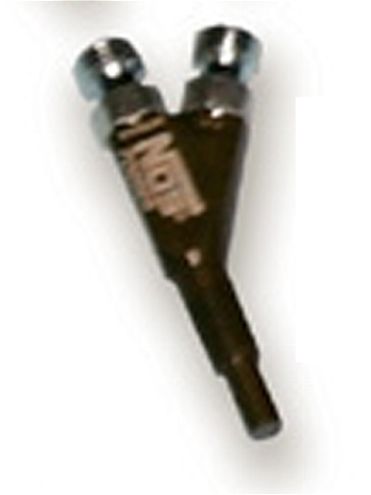



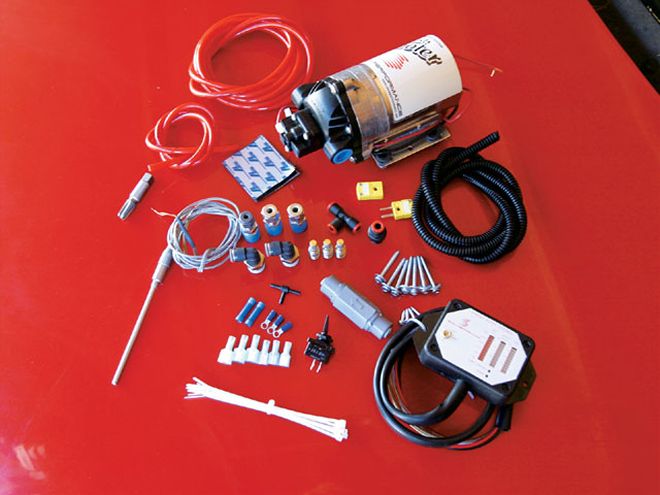
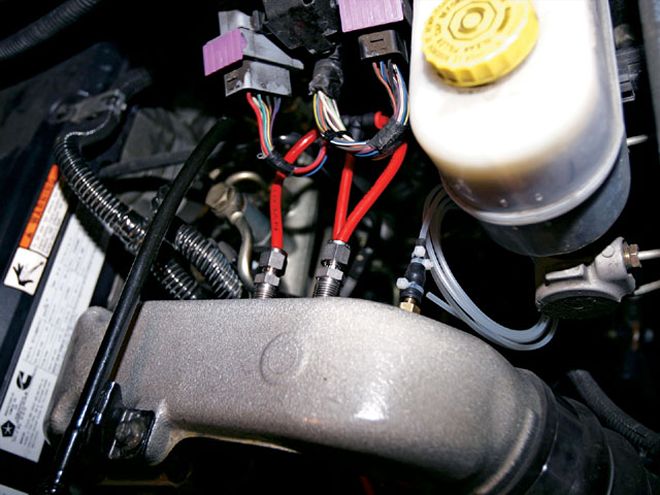
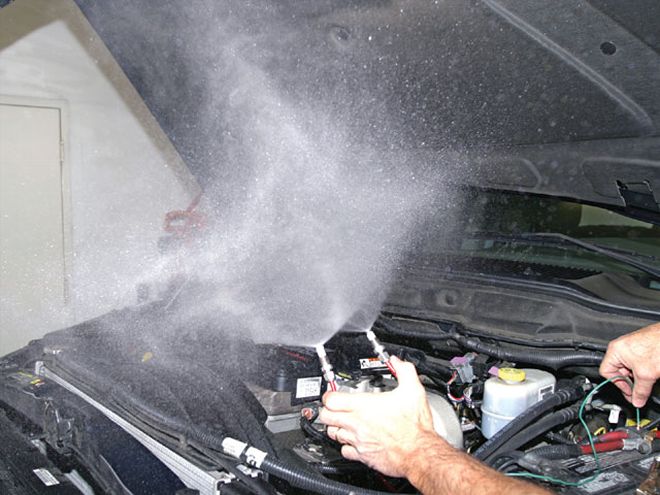
 | With water/methanol injection, a tank must be mounted somewhere (arrow), usually in the engine compartment of the truck. Space is at a premium here, so manufacturers of water/methanol injection kits will make the tanks as big as possible without cramping the engine bay.
This combination is used mainly as an intercooler, so trucks that will benefit the most from water/methanol are those that may have EGT issues. Methanol is a fuel, and detonation is a possibility when injecting it, so be careful if your truck is highly modified. If you are using straight water (which is best for EGT), it's possible that rust will form, but running distilled water with additives can cure this problem. Again, like propane, if your truck is mostly stock, this shouldn't be an issue. If you are towing, water/methanol can be very helpful in keeping EGT down, which will let you produce more power for longer time periods.
In the end, which one is right for you depends on the vehicle's usage. For dragstrips, sled pulls, and other performance events, nothing will beat nitrous. For towing and a little more power, propane can be very useful. Vehicles that need a little extra help intercooling can use a water/methanol injection. Propane and water/methanol injection are relatively cheap to use, while nitrous can cost 50 cents to $1 every second you are using it. Propane and water/methanol work full time in your truck and can be used for weeks or months without a refill. Nitrous, on the other hand, is only used for brief stints and runs out fast. Consider what your vehicle is used for, and choose the injectable that's right for you.
| With water/methanol injection, a tank must be mounted somewhere (arrow), usually in the engine compartment of the truck. Space is at a premium here, so manufacturers of water/methanol injection kits will make the tanks as big as possible without cramping the engine bay.
This combination is used mainly as an intercooler, so trucks that will benefit the most from water/methanol are those that may have EGT issues. Methanol is a fuel, and detonation is a possibility when injecting it, so be careful if your truck is highly modified. If you are using straight water (which is best for EGT), it's possible that rust will form, but running distilled water with additives can cure this problem. Again, like propane, if your truck is mostly stock, this shouldn't be an issue. If you are towing, water/methanol can be very helpful in keeping EGT down, which will let you produce more power for longer time periods.
In the end, which one is right for you depends on the vehicle's usage. For dragstrips, sled pulls, and other performance events, nothing will beat nitrous. For towing and a little more power, propane can be very useful. Vehicles that need a little extra help intercooling can use a water/methanol injection. Propane and water/methanol injection are relatively cheap to use, while nitrous can cost 50 cents to $1 every second you are using it. Propane and water/methanol work full time in your truck and can be used for weeks or months without a refill. Nitrous, on the other hand, is only used for brief stints and runs out fast. Consider what your vehicle is used for, and choose the injectable that's right for you.